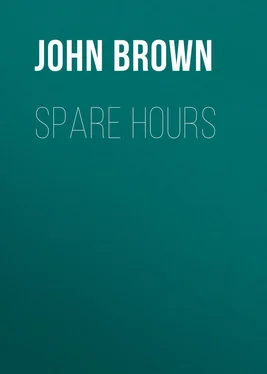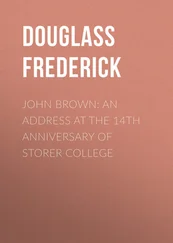John Brown - Spare Hours
Здесь есть возможность читать онлайн «John Brown - Spare Hours» — ознакомительный отрывок электронной книги совершенно бесплатно, а после прочтения отрывка купить полную версию. В некоторых случаях можно слушать аудио, скачать через торрент в формате fb2 и присутствует краткое содержание. ISBN: , Жанр: foreign_antique, foreign_prose, на английском языке. Описание произведения, (предисловие) а так же отзывы посетителей доступны на портале библиотеки ЛибКат.
- Название:Spare Hours
- Автор:
- Жанр:
- Год:неизвестен
- ISBN:http://www.gutenberg.org/ebooks/27153
- Рейтинг книги:4 / 5. Голосов: 1
-
Избранное:Добавить в избранное
- Отзывы:
-
Ваша оценка:
- 80
- 1
- 2
- 3
- 4
- 5
Spare Hours: краткое содержание, описание и аннотация
Предлагаем к чтению аннотацию, описание, краткое содержание или предисловие (зависит от того, что написал сам автор книги «Spare Hours»). Если вы не нашли необходимую информацию о книге — напишите в комментариях, мы постараемся отыскать её.
Spare Hours — читать онлайн ознакомительный отрывок
Ниже представлен текст книги, разбитый по страницам. Система сохранения места последней прочитанной страницы, позволяет с удобством читать онлайн бесплатно книгу «Spare Hours», без необходимости каждый раз заново искать на чём Вы остановились. Поставьте закладку, и сможете в любой момент перейти на страницу, на которой закончили чтение.
Интервал:
Закладка:
Spare Hours
AUTHOR’S PREFACE
In that delightful and provoking book, “The Doctor, &c.,” Southey says: “‘Prefaces,’ said Charles Blount, Gent., ‘Prefaces,’ according to this flippant, ill-opinioned, and unhappy man, ‘ever were, and still are, but of two sorts, let the mode and fashions vary as they please, – let the long peruke succeed the godly cropt hair; the cravat, the ruff; presbytery, popery; and popery, presbytery again, – yet still the author keeps to his old and wonted method of prefacing; when at the beginning of his book he enters, either with a halter round his neck, submitting himself to his readers’ mercy whether he shall be hanged or no, or else, in a huffing manner, he appears with the halter in his hand, and threatens to hang his reader, if he gives him not his good word. This, with the excitement of friends to his undertaking, and some few apologies for the want of time, books, and the like, are the constant and usual shams of all scribblers, ancient and modern.’ This was not true then,” says Southey, “nor is it now.” I differ from Southey, in thinking there is some truth in both ways of wearing the halter. For though it be neither manly nor honest to affect a voluntary humility (which is after all, a sneaking vanity, and would soon show itself if taken at its word), any more than it is well-bred, or seemly to put on (for it generally is put on) the “huffing manner,” both such being truly “shams,” – there is general truth in Mr. Blount’s flippancies.
Every man should know and lament (to himself) his own shortcomings – should mourn over and mend, as he best can, the “confusions of his wasted youth;” he should feel how ill he has put out to usury the talent given him by the Great Taskmaster – how far he is from being “a good and faithful servant;” and he should make this rather understood than expressed by his manner as a writer; while at the same time, every man should deny himself the luxury of taking his hat off to the public, unless he has something to say, and has done his best to say it aright; and every man should pay not less attention to the dress in which his thoughts present themselves, than he would to that of his person on going into company.
Bishop Butler, in his “Preface to his Sermons,” in which there is perhaps more solid living sense than in the same number of words anywhere else after making the distinction between “obscurity” and “perplexity and confusion of thought,” – the first being in the subject, the others in its expression, says, – “confusion and perplexity are, in writing, indeed without excuse, because any one may, if he pleases, know whether he understands or sees through what he is about, and it is unpardonable in a man to lay his thoughts before others, when he is conscious that he himself does not know whereabouts he is, or how the matter before him stands. It is coming abroad in disorder, which he ought to be dissatisfied to find himself in at home. ”
There should therefore be in his Preface, as in the writer himself, two elements. A writer should have some assurance that he has something to say, and this assurance should, in the true sense, not the Milesian, be modest.
I have to apologize for bringing in “Rab and his Friends.” I did so, remembering well the good I got then, as a man and as a doctor. It let me see down into the depths of our common nature, and feel the strong and gentle touch that we all need, and never forget, which makes the world kin; and it gave me an opportunity of introducing, in a way which he cannot dislike, for he knows it is simply true, my old master and friend, Professor Syme, whose indenture I am thankful I possess, and whose first wheels I delight in thinking my apprentice-fee purchased, thirty years ago. I remember as if it were yesterday, his giving me the first drive across the west shoulder of Corstorphine Hill. On starting, he said, “John, we’ll do one thing at a time, and there will be no talk.” I sat silent and rejoicing, and can remember the very complexion and clouds of that day and that matchless view: Damyat and Benledi resting couchant at the gate of the Highlands, with the huge Grampians, immane pecus , crowding down into the plain.
This short and simple story shows, that here, as everywhere else, personally, professionally, and publicly, reality is his aim and his attainment. He is one of the men – they are all too few – who desire to be on the side of truth more than to have truth on their side; and whose personal and private worth are always better understood than expressed. It has been happily said of him, that he never wastes a word, or a drop of ink, or a drop of blood; and his is the strongest, exactest, truest, immediatest, safest intellect, dedicated by its possessor to the surgical cure of mankind, I have ever yet met with. He will, I firmly believe, leave an inheritance of good done, and mischief destroyed, of truth in theory and in practice established, and of error in the same exposed and ended, such as no one since John Hunter has been gifted to bequeath to his fellow-men. As an instrument for discovering truth, I have never seen his perspicacity equalled; his mental eye is achromatic , and admits into the judging mind a pure white light, and records an undisturbed, uncolored image, undiminished and unenlarged in its passage; and he has the moral power, courage, and conscience, to use and devote such an inestimable instrument aright. I need hardly add, that the story of “Rab and his Friends” is in all essentials strictly matter of fact.
There is an odd sort of point, if it can be called a point, on which I would fain say something – and that is an occasional outbreak of sudden, and it may be felt, untimely humorousness. I plead guilty to this, sensible of the tendency in me of the merely ludicrous to intrude, and to insist on being attended to, and expressed: it is perhaps too much the way with all of us now-a-days, to be forever joking. Mr. Punch , to whom we take off our hats, grateful for his innocent and honest fun, especially in his Leech, leads the way; and our two great novelists, Thackeray and Dickens, the first especially, are, in the deepest and highest sense, essentially humorists, – the best, nay, indeed the almost only good thing in the latter, being his broad and wild fun; Swiveller, and the Dodger, and Sam Weller, and Miggs, are more impressive far to my taste than the melo-dramatic, utterly unreal Dombey, or his strumous and hysterical son, or than all the later dreary trash of “Bleak House,” &c.
My excuse is, that these papers are really what they profess to be, done at bye-hours. Dulce est desipere , when in its fit place and time. Moreover, let me tell my young doctor friends, that a cheerful face, and step, and neckcloth, and button-hole, and an occasional hearty and kindly joke, a power of executing and setting agoing a good laugh, are stock in our trade not to be despised. The merry heart does good like a medicine. Your pompous man, and your selfish man, don’t laugh much, or care for laughter; it discomposes the fixed grandeur of the one, and has little room in the heart of the other, who is literally self-contained. My Edinburgh readers will recall many excellent jokes of their doctors – “Lang Sandie Wood,” Dr. Henry Davidson our Guy Patin and better, &c.
I may give an instance, when a joke was more and better than itself. A comely young wife, the “cynosure” of her circle, was in bed, apparently dying from swelling and inflammation of the throat, an inaccessible abscess stopping the way; she could swallow nothing; everything had been tried. Her friends were standing round her bed in misery and helplessness. “ Try her wi’ a compliment ,” said her husband, in a not uncomic despair. She had genuine humor, as well as he; and as physiologists know, there is a sort of mental tickling which is beyond and above control, being under the reflex system, and instinctive as well as sighing. She laughed with her whole body and soul, and burst the abscess, and was well.
Читать дальшеИнтервал:
Закладка:
Похожие книги на «Spare Hours»
Представляем Вашему вниманию похожие книги на «Spare Hours» списком для выбора. Мы отобрали схожую по названию и смыслу литературу в надежде предоставить читателям больше вариантов отыскать новые, интересные, ещё непрочитанные произведения.
Обсуждение, отзывы о книге «Spare Hours» и просто собственные мнения читателей. Оставьте ваши комментарии, напишите, что Вы думаете о произведении, его смысле или главных героях. Укажите что конкретно понравилось, а что нет, и почему Вы так считаете.












